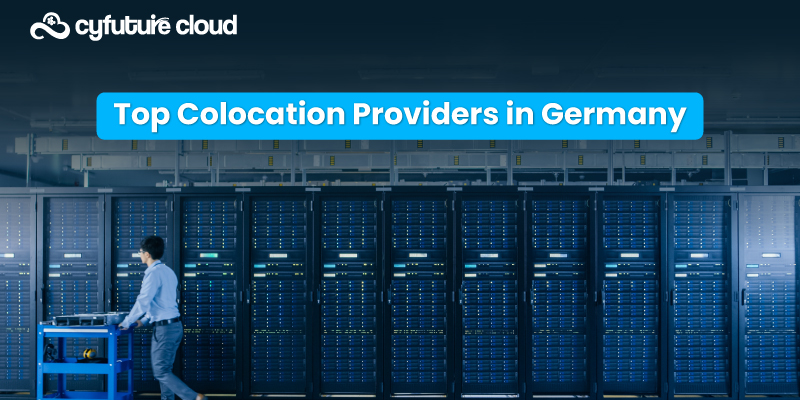Table of Contents
Here’s to your introduction to the “colo” (colocation) data center industry! Enterprise firms may keep their gear and equipment for data storage in these large-scale data center facilities since they are shared and secure. Colocation, however, is more complex than it first appears. Let’s go into the specifics of the technology and investigate the fascinating developments that will influence the colocation industry in 2023.
Colocation facilities provide a wide range of services for the server, storage, and networking equipment of diverse enterprises, including infrastructure, power, cooling, and physical security. Depending on their particular needs, clients can choose to lease or rent space in the form of rooms, cages, racks, or cabinets. It’s a cooperative setting where businesses may pool the resources made available by the data center, leading to considerable cost savings and other benefits.
Colocation offers the certainty of redundancy and less downtime, which is one of its main advantages. The danger of service outages is reduced with numerous systems in place, ensuring organizations can continue to operate without interruption. Additionally, colocation facilities offer increased security measures to protect important data and equipment. They provide round-the-clock IT assistance, letting businesses concentrate on revenue-generating initiatives and general advancements rather than running an on-site data center. Many businesses may start their cloud migration with colocation, allowing for a seamless switch to cloud-based services.
The colocation industry has grown astronomically over the last 10 years, and in 2023, this trend is anticipated to continue. Despite the difficulties brought on by social isolation and the work-from-home paradigm in 2020, the industry flourished in 2021 and 2022. The worldwide data center industry is anticipated to increase by 18% annually and reach $270 billion by 2024, according to Infiniti Research.
2023 seems to be an interesting year for the colocation industry given these tendencies. Regardless of your business’ size or sector, colocation can be the best option for your infrastructure and data storage requirements. To realize the full potential of your company in the digital age, leverage the pooled resources, cutting-edge technology, and industry-leading services offered by colocation data centers.
Top Trends to Dominating in 2023
Now, let’s take a closer look at the top six trends that will shape the colocation business in 2023:
Market Growth
Since 2021, the COVID-19 pandemic and the ensuing growth of the work-from-home economy have had a significant influence on the digital environment, compelling businesses to quickly modify their digital strategies in order to meet the demands of the new normal. As a result, in order to fulfil the rising needs of remote work and digital connection, service providers have been forced to implement methods that emphasize resilience and edge computing. Colocation data centers have become an essential part of sustaining these IT services and fostering the expansion of the digital economy in this setting.
The need for commercial real estate is being reevaluated by several industries and individual businesses as we have entirely transitioned to a post-pandemic society. Businesses are choosing more adaptable work arrangements as a result of the trend toward remote employment, which has resulted in a reduction in the size of actual office spaces. Companies have opted for cloud-based frameworks to help with this transformation and meet their needs for digital infrastructure. With their shared and safe surroundings, colocation data centers have grown in popularity among these companies.
Colocation provides the adaptability and scalability required to meet shifting business requirements. Companies may readily react to changes in their IT requirements by renting space in a colocation facility without having to make significant expenditures in physical infrastructure. Businesses may concentrate on their core capabilities and money-making initiatives thanks to this flexibility, leaving the server colocation provider to handle the administration and upkeep of the data center .
Additionally, colocation data centers offer the physical security, electricity, cooling, and infrastructure required for the efficient functioning of business-critical equipment. This frees up resources and enables companies to concentrate on their strategic goals by removing the burden of operating and maintaining an on-site data center.
As more firms realize the benefits of cloud-based frameworks and remote work, the development of the colocation industry is tightly related to the rising demand for IT services. Colocation is a desirable choice for enterprises of all sizes and sectors because to its flexibility, scalability, and cost-effectiveness. The demand for dependable and secure data storage and infrastructure solutions in an increasingly digital environment is anticipated to fuel the colocation industry’s growth in the next years.
Rise of Edge Computing
The development of edge computing passed a critical juncture as we entered 2023, firmly establishing itself as a standard technology. Edge computing skills are in high demand due to a confluence of variables, including the exponential rise in global data traffic, the ongoing need for innovation, the widespread deployment of 5G networks, and the long-term dominance of remote workforces. Colocation facilities are assessing these elements’ effects on colocation use cases, technical developments, and investment plans as a result.
A growing reliance on data-intensive applications and new technologies like augmented reality, the Internet of Things (IoT), and artificial intelligence has resulted in a huge surge in data generation. Traditional centralized cloud infrastructures usually fail because to the volume and speed required for real-time data processing and analysis. Edge computing can help in this situation by enabling data processing and storage closer to the source, lowering latency, and improving overall performance.
Additionally, the introduction of 5G networks has opened up previously unimaginable possibilities for edge computing. 5G is transforming businesses that depend on real-time data processing and very responsive apps thanks to its high bandwidth, low latency, and ability to accommodate a huge number of connected devices. By strategically putting their Data Center Noida closer to end users, colocation facilities are adjusting to this paradigm shift. This enables quicker data processing, increased network speed, and less congestion.
Another important factor influencing the adoption of edge computing is the continued use of remote workforces. The necessity for secure and effective data processing and storage at the edge is critical as remote work becomes a long-term reality for many enterprises. Edge computing gives remote workers speedier access to vital programs and data, allowing them to function normally no matter where they are physically.
The ramifications of these changes for colocation use cases, technological infrastructure, and investment plans are being keenly watched by colocation facilities. They are investing in edge data centers because they understand the increasing need for edge computing capabilities and that these facilities offer the required closeness to end users while maintaining the same degree of security, dependability, and scalability as conventional colocation facilities.
AI Demands On Infrastructure
The landscape of colocation data center services is changing as a result of the growing demands that artificial intelligence (AI) is placing on infrastructure. The introduction of AI computation as a service is expected to significantly alter how data centers run. In facility management, automation and robots will be crucial, modernizing many parts of operations and lowering reliance on human resources.
The quick emergence of AI technology has forced colocation data centers to adopt management strategies that are more effective and simplified. Utilizing automation technology will alter repetitive jobs and improve facility operations. Robots are being used to quickly replace failing servers, mount servers in racks, manage disk storage and connections, and improve site security. Together with human operators, these robotic solutions increase productivity and guarantee dependable, consistent performance.
Businesses may access AI capabilities thanks to AI compute as a service, which eliminates the need for significant infrastructure investments or specialized technical knowledge. Recognizing this rising demand, colocation providers are making investments in the infrastructure needed to serve AI workloads. Data centers are being outfitted with specialized hardware and high-performance computing clusters to accommodate the demanding computational needs of AI applications.
Beyond site management, AI technologies are being integrated into colocation data centers. AI-powered analytics and monitoring systems are being used to improve operational performance overall, maximize energy efficiency, and forecast equipment breakdowns. Real-time analysis of enormous volumes of data by these intelligent systems enables preemptive maintenance and resource allocation, which eventually results in cost savings and increased service dependability.
AI is used in colocation data centers to increase operational effectiveness and boost customer satisfaction. Service-level agreements are improved and faster service delivery is possible because of the capacity to automate repetitive processes and react quickly to changing needs.
Final Thoughts
In 2023, a number of trends and innovations have driven a transformation in the colocation data center sector. Cyfuture Cloud, a Cyfuture entity, distinguishes out as a top supplier of colocation services in this changing market. The four Tier-III Meity Empaneled Data Centers that make-up Cyfuture Cloud provide organizations with a safe and dependable setting in which to store their hardware and manage their vital data. These facilities are outfitted with the most recent technology. The infrastructure, electricity, cooling, and physical protection offered by these data centers enable uninterrupted operations for businesses of all sizes and sectors.
Businesses that work with Cyfuture Cloud can experience less downtime, more security, and improved scalability. Businesses may concentrate on revenue-generating initiatives and overall improvements rather than running an on-site data center thanks to the 24/7 availability of the knowledgeable staff at Cyfuture Cloud’s complete IT support.
Cyfuture Cloud also understands the value of adopting technology innovations. They have deliberately placed their data centers to serve edge computing, leveraging the strength of 5G networks, and meeting the demands of real-time data processing and very rapid apps.
Cyfuture Cloud is steadfast in its commitment to addressing the changing demands of organizations in the fast-paced world of technology. Their commitment to data sovereignty compliance, sophisticated security measures, and sustainability further establish them as a reliable partner for colocation services.
The colocation data center sector will continue to develop and influence the digital environment as time goes on. Businesses that use colocation, especially with the trustworthy services of Cyfuture Cloud, will be well-prepared to prosper in this digital transformation age. Businesses may realize their full potential and maintain an edge in the rapidly evolving digital world by utilizing the shared resources, cutting-edge technology, and sector-leading services offered by Cyfuture Cloud.
Recent Post
Send this to a friend

 Server
Colocation
Server
Colocation CDN
Network
CDN
Network Linux
Cloud Hosting
Linux
Cloud Hosting Kubernetes
Kubernetes Pricing
Calculator
Pricing
Calculator
 Power
Power
 Utilities
Utilities VMware
Private Cloud
VMware
Private Cloud VMware
on AWS
VMware
on AWS VMware
on Azure
VMware
on Azure Service
Level Agreement
Service
Level Agreement 



















